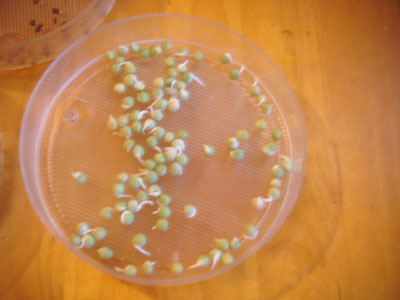 |
|
| > Welcome > Grow and Eat > Growing Sprouts
|
|
Growing Organic Food without a Garden!Almost anyone can grow a good portion of their fresh food needs, no garden needed! All you need is a jar, something to strain water through but catch your crop, water and organic mung beans, seeds, lentils, legumes or nuts! In three to five days you will be munching down on organic vegetables! "Each sprout is a tiny miracle. As germination begins, a flow of energy is triggered which produces enzymes. These enzymes start a marvellous chain reaction: The carbohydrates are changed into digestible sugars; Complex proteins are converted into simpler amino acids; Fats become fatty acids; Vitamins, minerals and other trace elements are absorbed and combined with the amino acids. Simply put, sprouts are predigested - so all their goodies are absorbed easily when they enter the digestive process. What can I Sprout?Lots! As well as the popular mung bean and alfalfa seed you can sprout any seed which grows into a non-poisonous plant. This includes grains (wheat, rye, barley, oats), legumes (lentils, chick peas, peanuts, soy beans), seeds (sunflower, sesame, pumpkin). One tablespoon of soy sprouts supplies half the recommended adult daily dose of vitamin C. And alfalfa sprouts contain the entire B vitamin complex and are a good source of vitamins A, C, D, and E, and the minerals calcium and magnesium. All sprouts contain increased amounts of the important B vitamins and vitamin C, sometimes up to 500% more! A good way to know if the seeds, grains or legumes you are buying have been heat treated is to try and sprout them - treated seeds won’t sprout. Only sprout from edible food - not garden seeds. Sprouting requires no gardening skills. The main thing is to remember to rinse them twice a day. Here are detailed instructions: How to Sprout1 Soak 3 tablespoons of seeds overnight in a preserving jar with a generous amount of water. 2 Cover the jar with a plastic sprouting lid, a jar ring and a screen wire, or a piece of net or stocking. 3 The next day drain and rinse the seeds. If you turn the jar upside down they will drain properly. 4 Sprouts grow fastest and best in a dark place at about 21ºC. So put them in the most ideal place you can find and try to remember where you put them! 5 Rinse and drain the seeds morning and night. In summer you can also rinse in the day, to stop the seeds fermenting. Wheat, rye, peanuts and almonds should be eaten when the shoot has just appeared. Mung beans, lentils, chick peas and blue peas are best when the shoots are almost as long as the seed. Grow alfalfa until the leaves appear and turn green in the light. As with all raw food, fresh is best, but you can store your sprouts in a sealed plastic bag or airtight container in the fridge. Use within 5-7 days. Alfalfa will keep growing and will taste just as good for a week." Extract from page 60-61, "Stepping into Food for Life" published by Health For Life Ministry NZ, first published 2001 "Stepping into Food for Life" one of series of nine books published by our earlier lay ministry called Health For Life. This book is available in some New Zealand Public Libraries. We are hoping to publish all nine of of these health books, online, as PDF's in the future, according to God's will. We believe the time, energy and strength will be provided by Him, in His timing, to do this work.
Posted: Mon 12 Aug 2013 Make an Enquiry |
|
|
